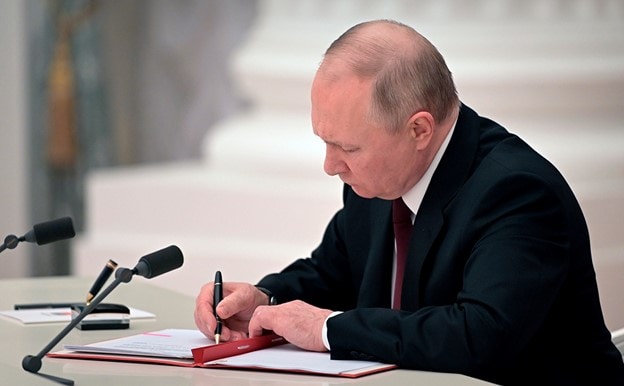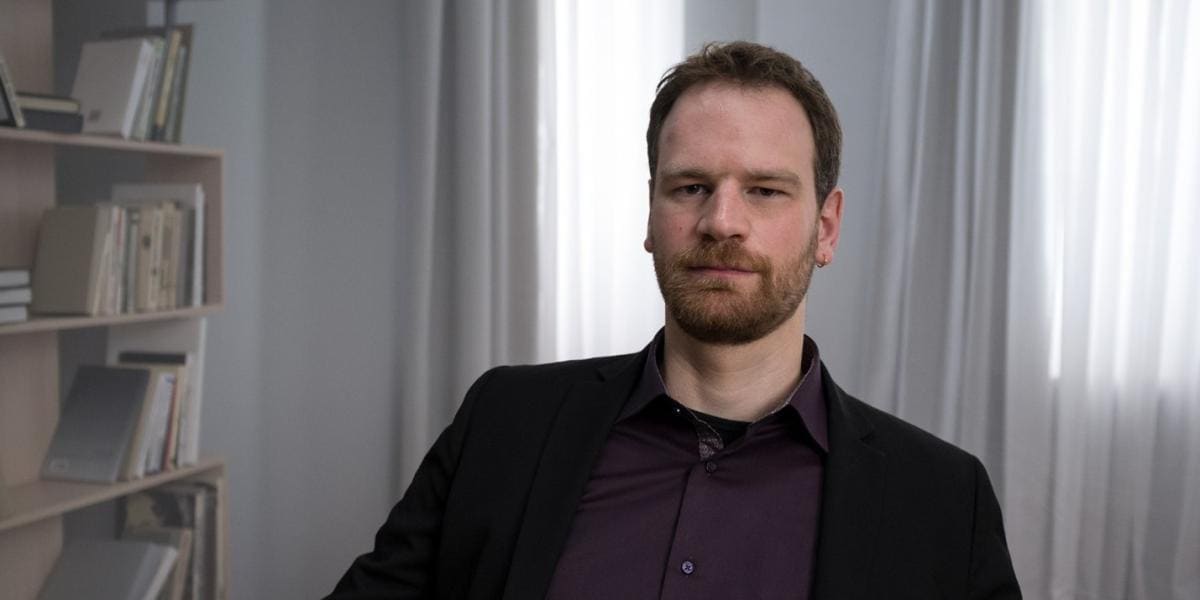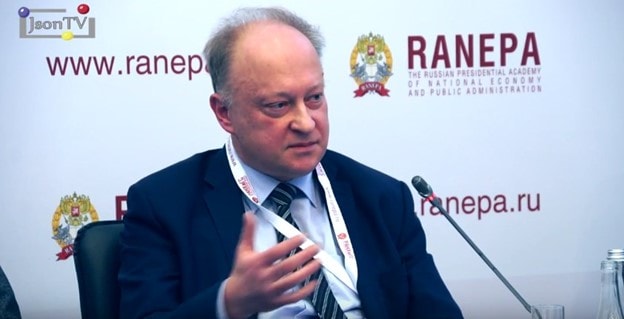On February 21, 2022, Vladimir Putin signed a decree recognizing the breakaway Luhansk and Donetsk Peoples Republics as independent state and promptly sent in Russian "peacekeepers". While the move was anticipated, many observers believed that there was something missing. A day before Andrei Kortunov the head of the Russian International Affairs Congress wrote a long analysis for Kommersant that MEMRI presents below. In this analysis, Kortunov argued that such recognition had a few pluses but many more minuses. It would mean that Ukraine had outplayed Russia and saddled it with the blame. Ukraine would maybe lose some territory, but could actually emerge stronger. The departure of the pro-Russian region would demographically strengthen the power of anti-Russian forces in the country. While NATO membership remained remote, military cooperation and arms deliveries to Kiev would increase. This begs the question of why Putin would be willing to accept these consequences and Western sanctions for the satisfaction of recognizing the breakaway republics?

Putin signing the decree recognizing the breakaway republics (Source: Rbc.ru)
A major unresolved question is what was Putin recognizing? Was he recognizing the republics in the territories that they actually control today or the territories that they claimed when proclaiming their independence from Kiev. These territories are much larger and contain the Black Sea port of Mariupol. If Russia tried to wrest these territories away from Ukraine, Kiev would have to fight.
Grigory Yudin, Professor of Political Philosophy at the Moscow School of Social and Economic Sciences told the BBC' Russian service that the issue of the republics' borders is crucial." If Russia recognizes the DPR and LPR within the borders that the republics themselves designate, then there is war. If, however, within the borders at the moment and with reservations, then recognition can be a way to reduce the escalation."[1]

Grigory Yudin (Source: Openuni.io)
The head of the State Duma Committee on CIS Affairs, Leonid Kalashnikov, espoused the broader interpretation and said that Russia recognizes the LPR and DPR within the Luhansk and Donetsk regions.
"This agreement does not specify, but I think that it means statehood...in other borders than those currently occupied by the DPR at the moment. Most of these areas are controlled by Ukraine, but the Donbass republics consider these territories to be their own.[2]
The Deputy Chairman of the Federation Council Committee on International Affairs Andrey Klimov said the opposite. Russia had recognized the independence of the DPR and LPR within the actual borders. "We are talking, of course, about those territories that are within the boundaries established today. Everything else is outside the scope of legal actions."[3]
Reporters sought clarity from Putin's Press Secretary Dmitry Peskov but didn't obtain it.
Peskov told them that the Donetsk and Luhansk republics are recognized as independent "within the boundaries in which they have been proclaimed and exist." When journalists pressed Peskov on whether he was talking about the existing current borders or what the republics proclaimed, Peskov replied that he had nothing to add to what had been said. "I have said all I can on this topic."[4]
According to political scientist and columnist George Bovt the haziness is deliberate. He was asked in an interview. "Is it a coincidence that the territory of the two unrecognized republics is not spelled out in the treaty?"
"- No, it is not by chance, this is a matter of further bargaining, including the strength of the imposed sanctions and what to expect next. This is the subject of bargaining between Russia and the West. And if the sanctions are tough, then there will be nothing to lose and you can go further, and then it's already a war.[5]
As mentioned, the suspicion that Putin is after something bigger is nourished by analyses such as Kortunov's that sees Russia as the loser in the recognition gambit, if that is the way that the crisis ends. Kortunov's analysis follows below:[6]
"A week ago, it may have seemed that the most acute phase of the Ukrainian crisis was already a thing of the past, and the situation was starting to straighten out. There were good reasons for such an optimistic reasoning.
"Foreign Minister, Sergei Lavrov during a February 14 meeting with President Vladimir Putin, assured the Russian president that the possibility for a diplomatic solution to the security crisis in Europe had not yet been exhausted, and that the dialogue with the West must continue.
"German Chancellor Olaf Scholz's visit to Moscow on February 15 proceeded generally positively; it seems, there was even a prospect of reaching an agreement on some sort of moratorium on Ukraine's accession to NATO.
SUPPORT OUR WORK

"The Russian Defense Ministry announced the return of divisions of the Western and Southern Military Districts to their permanent deployment points after the ending of [military] exercises near the border with Ukraine.
"True, the Duma's appeal to the president on the recognition of the DPR's and LPR's independence looked somewhat discordant against this backdrop. But, the president himself responded very evasively to this appeal, referring to the importance of implementing the Minsk agreements.
"Many observers concluded that Vladimir Putin simply wanted to have an additional trump card up his sleeve in order to get greater compliance out of Kiev.
"But things have changed literally within the last few days.
"The epicenter of the crisis moved from the Russo-Ukrainian border to Donbass, where rapid escalation began as early as the morning of February 17. The number of shellings along the entire line of contact between the opposing forces has grown sharply; there were mutual accusations of truce violations, including with the use of heavy weapons. The next day, the leaders of the DPR and LPR, Denis Pushilin and Leonid Pasechnik [respectively], announced the start of universal mobilization and the evacuation of civilians to Russia. Moscow blamed Kiev for the unfolding events, while Washington put the blame on Moscow.
"One might get an idea that regardless of who is responsible for the recent exacerbation of the situation, the Donbass events could well follow the 'Georgian scenario' of 2008. In other words, Moscow will in one way or another proceed with the diplomatic recognition of the self-proclaimed republics, to be followed by the deployment of Russian troops on the republics' territory and [subsequent] the freezing of the Donbass conflict for years, if not decades to come. The alternative, scenario i.e. the total evacuation of the DPR's and LPR's population to neighboring Russian regions and the return of depopulated Donbass territory to Kiev, looks much less likely.
"Russia's direct involvement in the conflict on the side of the self-proclaimed republics will, in all likelihood, will facilitate the prevention of potential future armed confrontations in Donbass, as Kiev will hardly want to antagonize Moscow with new military provocations. But that, perhaps, exhausts the list of all advantages of diplomatic recognition for the Russian side. The inevitable accompanying negative consequences, however, appear to be much more numerous and diverse.
"First and foremost, the recognition scenario would mean that Kiev has conclusively outplayed Moscow in a difficult diplomatic game surrounding the implementation of the Minsk agreements. It is precisely the Russian side that will end up being the party responsible for burying the Normandy process, despite the fact that for 7 years after the signing of the Minsk agreements, the main complaints about their implementation were invariably addressed to the Ukrainian authorities.
"Needless to say, after Moscow's recognition of the DPR and LPR, there will be no further political pressure from the West on Kiev. In addition, Russia shouldn't even count on China's political support in this case, because an unambiguous statement that all parties must strictly comply with the Minsk agreements was made by Beijing.
"Radical Ukrainian nationalists will be happy, as the final amputation of Donbass from the rest of Ukraine will facilitate an even further shift of the domestic Ukrainian balance of political power in their favor, just as Russia's annexation of Crimea shifted that balance back in the day.
"Naturally, [under such a scenario] the highly complex and extremely costly task of post-conflict reconstruction of Donbass will become Moscow's permanent headache, rather than Kiev's or that of the Western capitals.
"A change in the Donbass status quo will no doubt trigger a new salvo of Western sanctions against Russia. The US and its allies will perhaps make use of the homemade preparations in a case of a direct Russian incursion into Ukraine. In fact, in the Western narrative, the deployment of Russian contingent at the DPR and LPR will be perceived as a form of Russian invasion, despite the fact that such an act is not as obvious as a frontal assault by the Russian army on Kiev or Kharkiv
"The main uncertainty will be the price that Moscow will have to pay for its decision on diplomatic recognition. In other words, the question is what discount [in Western penalties] will Russia be able to count on in case of recognition of the republics, compared to a large-scale armed incursion in Ukrainian territory (beyond the Donbass borders).
"Will the toughest possible batch of economic sanctions, targeting Russian energy exports and the Russian financial sector, be deployed?
"How relevant will the Western proposals on military confidence-building measures, restoration of communication lines between Russia and NATO, and arms control in Europe be?
"How will the outlook of NATO's military-technical support of Ukraine change, and will the West be ready to deliberate on the possibility of a moratorium on Ukraine's membership in the North Atlantic Alliance?
"Will the talks at the highest level continue, and will the practice of Western ministers coming to Russia continue?
"How will relations between Moscow and Western capitals develop after the DPR and LPR become analogues of Abkhazia and South Ossetia?
"So far, there are no clear answers to all of these questions. Diplomatic recognition and even the introduction of Russian troops into the DPR's and LPR's territory is not the same as the bombing of Kiev, or the seizure of Kharkiv and Mariupol. What's more, the West has anyway never doubted the Russian military presence on the territory of Donbass.
"The republics' change of the status quo would be just another verification of the well-established Western narrative about the nature and driving forces of the Ukrainian conflict.
"At the same time, the West, as well, cannot leave Russian actions without a response. Sanctions measures have already been developed and authorized, and at least some of them will be introduced one way or another.
"In all likelihood, disagreements between the US and the UE on economic sanctions will unavoidably arise: Washington will advocate the toughest possible version of these sanctions, while Brussels will take a more moderate stance, resisting the White House's attempts to move from targeted to sectoral sanctions.
"However, military-strategic sphere-wise, the US and NATO will, as always, demonstrate a touching accord, which will put in doubt even just a restart of the full-fledged operation of the NATO-Russia Council, not to mention the introduction of any military confidence-building measures in Europe.
"The DPR's and LPR's recognition on part of Moscow will hardly accelerate the process of Ukraine's accession to NATO, but, certainly, any talk of a moratorium on this accession will be curbed for the time being. Kiev's military-technical cooperation with the North Atlantic Alliance will receive a powerful new stimulus and will probably include the supply of more modern and potentially more destabilizing weapons than it the case today.
"There will be a pause in the political Russo-Western dialogue; the Western leaders' visits to Moscow, which have recently become customary, will be put on hold. The actual partition of Ukraine will signify the final formalization of Europe's division, which may persist for a rather long time.
"There will be clarity in Russia - the West relations, but it will be the crystal clarity of a cold January dawn, when the scalding north wind takes your breath away and squeezes involuntary tears from your eyes."

Andrey Kortunov (Source: Json.tv)




